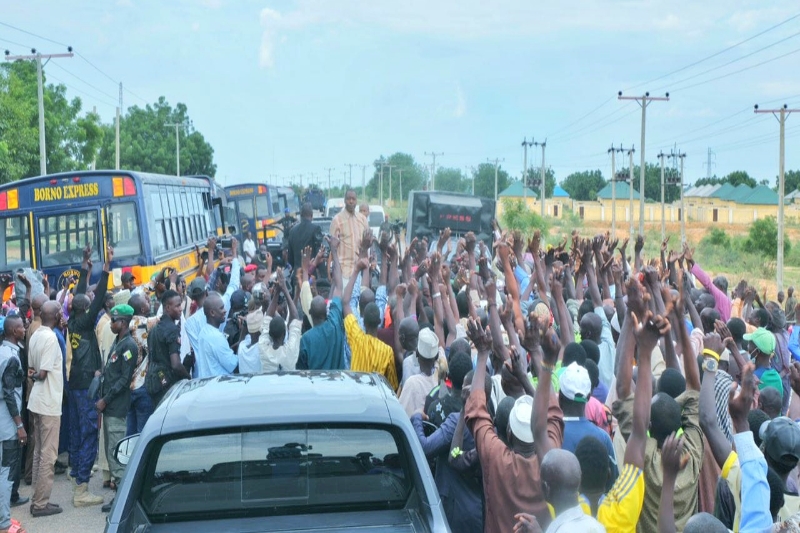Borno State governor distributes cash, food, temporary shelters, mats and blankets to returnees from conflict-ridden Niger Republic.
Borno State governor Babagana Umara Zulum has promised to provide petrol at subsidised rates to farmers in Damasak to enhance agricultural productivity in the district.
Zulum visited Damasak, the headquarters of the Mobbar Local Government Area, on Tuesday, February 6.
The main purpose of his visit was to see the living conditions of people in the town, particularly those who recently returned from the Niger Republic because of the ongoing conflict in that country.
Zulum said he had received a report that many of the returnees – most of whom fled to Niger to escape attacks at the peak of the insurgency in Nigeria – did not have shelters or basic necessities.
“As a result of the crisis in Niger, they [the people] returned home [to Damasak], but unfortunately, they don’t have shelter. So, we are here to provide relief to them, especially blankets, mats, food and non-food items,” Zulum told journalists.
During his visit he supervised the distribution of ₦100 million in cash to more than 20,000 vulnerable women, including widows and those from internally displaced camps. Each woman received ₦5,000 and a wrapper.
Food, temporary shelters, mats and blankets were distributed to 3,847 families. The head of each household received a ₦50,000 cash token to be used for provisions.
He also approved housing for teachers who had been given posts in Damasak but were not residents of the town.
Zulum told farmers in the district that he was aware that they relied on generators to pump water to their farmlands but that they were struggling because of the high cost of fuel.
“To alleviate this challenge, I will be providing assistance to farmers soon. The government will identify two fuelling stations and supply PMS [Premium Motor Spirit] and subsidies to reduce the cost for the farmers. This will enable them to purchase PMS at a lower price, making it more affordable for them to irrigate their farmlands.
“The Borno State government will also procure solar water pumps and, in addition to this, we will install drip irrigation and sprinkler irrigation facilities in this town,” Zulum said.
Damasak is one of Borno State’s agricultural hubs. At the peak of the insurgency, the town was taken over by members of the Jamā’at Ahl as-Sunnah lid-Da’way Wa’l-Jihād (JAS), better known as Boko Haram. Nigerian security forces, with the help of soldiers from Niger and Chad, liberated the town in 2015.
RNI published a story about two months ago in which a farmer from Damasak said the exorbitant fuel costs were stopping him from irrigating his land.
Modu Fannami said: “The only problem we [farmers in the district] are facing right now is that we cannot afford to run our generators to pump water to our lands. One litre of petrol costs ₦1,200. You can imagine how many litres we need. We are pleading with the government to come to our aid. We cannot afford the fuel we need to irrigate our lands.”
After Zulum’s visit this week, farmer Modu Aisami said: “We thank the Almighty for sending the governor to our rescue. We are really happy with the way he showed his concern. We are praying to God to give him the ability to fulfil the promises he made.
“He promised to build filling stations and to sell fuel at an affordable price. He said he would give us fertilisers and seedlings and approve the installation of boreholes.
“He did not give a specific date but we know he is well aware of the importance of irrigation farming and the need to enhance agricultural productivity.”
Idrissa Modu, a resident of Damasak, told RNI that the people of Mobbar were grateful to Zulum for taking the time to visit.
“Before his visit we were extremely worried because most farmers in the district cannot afford fuel, meaning they are not able to irrigate their lands. Now we are feeling much more motivated. We hope he will fulfil his promises.”
Modu said farming in the district was at times challenging.
“We have been attacked by insurgents. A few times insurgents even killed soldiers who were trying to protect us. Some farmers have been abducted and only released once ransoms were paid.
Although attacks still occur, it is better than it was in years gone by.
“Another challenge we have to overcome is when Fulani herders allow their animals on to our farmlands instead of letting them feed in the bush. The animals eat our crops and we are left without a harvest.”
AYSHA MUSTAPHA KOLOMI









